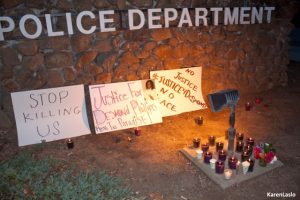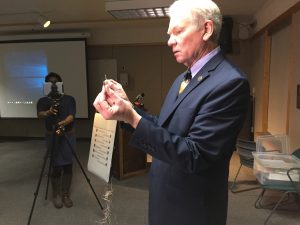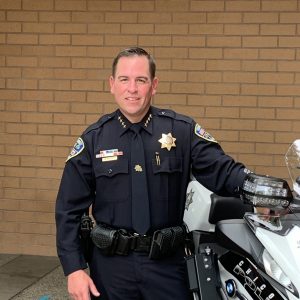by Leslie Layton
story updated at 4 p.m. Nov. 4
Local law enforcement agencies violated the law when they failed to respond fully and promptly – the Butte County District Attorney’s Office didn’t respond for months — to public record requests made by a local journalist.

District Attorney Mike Ramsey didn’t respond to a pair of public record requests made by ChicoSol contributor Dave Waddell during the 10-day period required by the California Public Records Act (CPRA), and in fact didn’t respond at all until Waddell hired an attorney.
Waddell, formerly this publication’s news director, says records were “unlawfully withheld” by both the DA and Chico Police Department. He has now spent about $20,000 in attorney fees seeking documents related to law enforcement killings that occurred during the 34-year tenure of DA Ramsey. (Read Waddell’s three-part series for ChicoSol on newly released records here, here and here.)
Waddell, who is writing a book about Butte County law enforcement killings, has directed requests to the DA, the Chico Police Department and the Butte County Sheriff’s Office over the past couple of years. The DA, Chico PD and to a lesser degree the Sheriff’s Office failed to provide complete responses until Waddell’s attorney intervened.
“It’s a real shame that it’s taken this long to obtain records that should have been made public a long time ago,” said David Snyder, an attorney and the executive director of the San Rafael-based First Amendment Coalition, after hearing about the challenges Waddell faced. “And it’s even more a shame that money had to be spent.
“The Public Records Act is supposed to be usable by people who aren’t lawyers and who don’t have a lot of resources.”
Butte County District Attorney Mike Ramsey responded today to a Nov. 3 request for comment on why Waddell’s initial requests went unanswered. “I probably should have talked to Dave sooner, I agree, but the workload here was such that I had to make priorities.”
But under the California Public Records Act, an agency must provide a helpful response within 10 days, offering a timeline for access to disclosable documents or referring the requester elsewhere. Confidential information for witnesses or other parties can be redacted.
The law also states that a public agency, in response to a public records request, must assist in identifying “records and information that are responsive to the request …”.
In July 2020, Waddell submitted a Public Records Act (PRA) request for the DA’s final reports on all 36 officer-involved shootings that had occurred since Ramsey first took office (the number has since risen to 37) . All of those reports had been released earlier at the conclusion of each investigation.
There was no response to that PRA request or to a follow-up request Waddell made in September of last year, so he placed a call to the Butte County Counsel’s office, which had been cc’d on the requests.
Responding to Waddell’s call, Assistant County Counsel Brad Stephens left a voicemail indicating he had been asking Ramsey to release the reports but that “frankly” the DA had been unresponsive to him as well.
“Simply ignoring a request is a violation of state law,” attorney Snyder said.

Waddell then hired the San Francisco law firm Cannata, O’Toole, Fickes & Olson, and attorney Aaron Field intervened on Waddell’s behalf. Field sent a letter that reminded Butte County that Waddell had the right to file a lawsuit but preferred to resolve the problem “informally.”
“Sometimes it takes a lawyer coming in and writing a letter,” Field observed. “This is frustrating because it’s not how these laws are supposed to work. It’s frustrating for a lot of journalists to have to bring in legal counsel.”
It also means that most local reporters would likely abandon the effort; a delayed or non-response can render good public access laws useless.
“The average reporter would have lost interest a long time ago,” said Waddell, who has more than 40 years of experience as a journalist and journalism teacher. Most reporters – even if they had the funding and support of the newspaper involved – would have found that the story had lost timeliness and moved on to other topics.
Waddell said he received full and prompt compliance to record requests – without an attorney’s assistance — from the Paradise Police Department, the Oroville Police Department, the Gridley-Biggs Police Department and the state Department of Fish and Wildlife.
Waddell directed several record requests to the Sheriff’s Office during 2020 related to the killings of Richard Moulton (2019), GD Hendrix (2018), and Cory Bush (2014).
“The Sheriff’s Office eventually turned over most or all the records in these cases,” Waddell said, “but it took a good deal of follow-up by my attorney.”
Whenever an officer-involved shooting occurs, investigative reports are produced by the Butte County Officer Involved Shooting/Critical Incident Protocol Team under Ramsey’s supervision. The team summarizes its interviews, analyzes the shooting scene and helps determine whether the killings were justified under the law. (All 37 shootings on Ramsey’s watch were deemed justified.)
Between November 2020 and March 2021, Waddell requested records from Chico PD related to five killings involving its officers. The city provided some records and then pronounced Waddell’s record requests “closed.”
“It seems to me that Chico PD in some manner broke the law and very deliberately destroyed public records …” — Dave Waddell
But after Field intervened – video of officer interviews conducted during the investigations, as well as other documents, were missing — the city turned over or promised to produce many more records related to the cases of Eddie Sanchez (2015), Desmond Phillips (2017), Tyler Rushing (2017) and Stephen Vest (2020).
“Chico PD always responded within the initial 10 days, but never produced many of the key public records requested — even after many months of delays — for most of the PRAs submitted,” Waddell said.
In the case of an earlier Chico PD killing, that of 19-year-old Breanne Sharpe in 2013, the city turned over some reports from the Officer Involved Shooting Protocol Team. However, the city then informed Waddell’s attorney that Chico PD had not retained the protocol team reports on the other four killings — including that of Vest, who died in a barrage of police bullets on Oct. 14, 2020.
Waddell said attorney Field then “pressured” Ramsey, who “reproduced” the reports for Chico PD, which is the party responsible for redacting the reports before they’re made public. Ramsey said today it was his feeling, after receiving the first requests from Waddell in the summer of 2020, that it was Chico PD’s responsibility to provide the records.
That was never made explicit until much later, after Field had intervened.
“It seems to me that Chico PD in some manner broke the law and very deliberately destroyed public records rather than disclose them to the public,” Waddell said. “I think that reveals a lot about the administrative honesty of this department.”

Chico Police Chief Matt Madden couldn’t be reached for comment on this story, and his office twice referred this reporter to the City Clerk’s Office that handles most records requests when attorneys aren’t involved. ChicoSol told Madden’s office it had questions about policy on records retention.
“There were things we expected to see that the City said it didn’t have,” Field explained. “This was resolved by looping in the District Attorney’s Office … We are disappointed that it was necessary to go back to the county and then back to the city, but glad the city is now working to produce them.”
Field and Waddell believe the agencies are now on the road to full compliance.
“We don’t know enough about the shooting of Stephen Vest,” said Waddell, “but I know more now.”
Records requesters can file a lawsuit against a non-compliant agency, and if they’re successful, force the agency to cover attorneys’ fees. But it’s time-consuming and expensive, a route Waddell prefers not to have to take.
“That stick helps to motivate agencies and is sometimes necessary to get compliance,” Field noted.
Snyder said that when agencies aren’t accustomed to addressing these requests they may “start to treat the records as their own” and “devolve into secrecy.”
Field, though, offered what he called a “charitable interpretation” of the obstacles Waddell has faced, suggesting that the local offices could still be adjusting to changes in the law made several years ago.
“One would hope this is not going to be a recurring issue,” Field said.
After spending such a large sum of money on his project, Waddell is less charitable. “I think they were adapting to the new laws and didn’t want to do the [redacting] work that’s required by state law,” he said.
Waddell said the reams of records that are now expected to be released for the first time are likely to tell more complete and complicated stories than do the final reports written by Ramsey. The more complex stories can help the community better understand these tragedies. The DA’s reports, he believes, have been unquestioned for too long.
“The DA has been interpreting and orchestrating all these investigations, and the Enterprise-Record has treated every announcement by Ramsey like it was some sort of objective revelation,” Waddell said. “Before reviewing all these records, I would not have believed how fixed these investigations are.”
The “Police Transparency Guide” authored by the First Amendment Coalition notes that California, for decades, was “one of the most secretive states when it came to information about police misconduct.” But several transparency laws have been a major step toward reform.
SB 1421, “The Right to Know Act,” took effect Jan. 1, 2019, broadening public access to records related to incidents involving use-of-force by law enforcement agencies. Another law that took effect in 2019 is AB 748, allowing access to audio and video recordings in so-called critical incidents.
Field said the problem of compliance with the Public Records Act is “more widespread than just Butte County.” These laws, he suggested, need to incorporate “additional penalties for delays in disclosure” and more precisely define the obligation to “prompt disclosure.”
“That’s something the Legislature could improve,” Field said.
Leslie Layton is editor of ChicoSol.
District Attorney Mike Ramsey’s comments were added to this story when he responded after its early Nov. 4 posting.
To help ChicoSol provide more in-depth journalism and defray the costs of this reporting, please consider making a donation to our North Valley Community Foundation fund here.

I really appreciate the increased information the public has been able to have because of ChicoSol’s journalism. I believe these deaths could have been prevented had trigger-happy police not been involved and mental health providers could have handled the stressful situations. In memory of those who lost their lives it is the least we can do to support Dave Waddell to keep at this gruelling task of pursuing records that are supposed to be public but have been withheld or destroyed by the DA or police.
Butte County District Attorney Mike Ramsey responded today to a Nov. 3 request for comment on why Waddell’s initial requests went unanswered. “I probably should have talked to Dave sooner, I agree, but the workload here was such that I had to make priorities.”
I say WHAT RUBBISH! Is Ramsey the only person who is busy? If he can’t do the job he can resign.
I can’t prove it but I allege the DA has orchestrated the withholding of police records. I allege Ramsey has manipulated the supposedly independent and impartial investigations of the thirty-seven civilian killings by the illusory “Butte County Officer-Involved Shooting/Critical Incident Protocol Team.” The public needs to know that Ramsey supervises the Protocol Team investigations and selects the officers. I allege Ramsey directs the investigators to arrive at his desired conclusion. I allege that the fact that Ramsey has exonerated the officers in every killing reveals his bent to protect, from legal repercussions, his fellow law enforcement colleagues when they use lethal force on civilians.
I am making a donation to ChicoSol now. Please join me. Thank you, Dave Waddell and Leslie Layton for your time and treasure to expose the violations of state disclosure laws by Butte County law enforcement officials. I challenge the good people of Butte County to make donations to ChicoSol and to pressure DA Ramsey to RESIGN.
This is such valuable information, so important for the community to know the details that were not disclosed in the official reporting of these tragic officer involved shooting deaths. My gratitude to ChicoSol, to Leslie Layton and to Dave Waddell. We the public depend on transparency and accountability of law-enforcement to feel safe in our communities. Sadly, it seems these are sorely lacking in Chico/Butte County. If you haven’t yet, please read the three articles that Waddell wrote, revealing information not disclosed in the official reports written by DA Ramsey.
It is high time that the State of California Department of Justice, headed by Attorney General Rob Bonta, investigate the patterns and practice of law enforcement in Butte County. Nobody should have to hire a lawyer to get this public information, with all the expense and time that involves. It’s obvious that Butte County law enforcement, and Ramsey in particular, was and still is, withholding information that would have helped the Rushings as they went to court.
We in this community owe a debt of gratitude to Leslie Layton and Dave Waddell for bringing this to light……it takes a lot of time, money, and commitment to a healthy, participatory, local democracy.
This is shocking! Do we live according to law in Butte County or don’t we? Is this the kind of justice we can expect from the the Chico Police and Butte County District Attorney? Thank you, Dave Waddell, for your commitment to journalistic truth. The personal and financial cost to you to bring light to such dark dealings in Butte County should make us all ashamed.
So, how can citizens put Ramsey and Madden on trial for breaking the law?
Dear A. P Porter & ChicoSol Readers:
Contact the California Attorney General, Rob Bonta, and demand his office investigate the policies and/or practices of the District Attorney and the Chico PD. Have the ChicoSol articles handy when you make your request.
Scott Rushing, Tyler’s Dad
California Attorney General Phone Numbers and Emails
Toll-Free Number:
(800) 952-5225
Call customer service
(916) 322-3360
(800) 952-5225
California Attorney General Contact Information
California Attorney General Website:
http://www.oag.ca.gov
California Attorney General Online Chat:
Visit contact page
Corporate Office Address:
P.O. Box 944255
Sacramento, California 94244-2550
United States
Edit Business Info
Outrageous! These people should resign in disgrace…at a minimum.
One of the major issues involved here is the fact these counties are remote in California and have and can continue to side step requests since most people of influence are not interested in some redneck county. Bay Area and LA people hold public officials accountable and have the funds and connections to get answers quickly. In the case of Butte County, no one cares what happens except the locals who just have zero influence in California politics/power. And, no one in that county knows how to get things done!
“The DA has been interpreting and orchestrating all these investigations, and the Enterprise-Record has treated every announcement by Ramsey like it was some sort of objective revelation,” Waddell said. “Before reviewing all these records, I would not have believed how fixed these investigations are.”
RAMSEY ORCHESTRATED THE INVESTIGATIONS.
THE INVESTIGATIONS WERE FIXED.
RAMSEY IS A CRIMINAL.
THIS AIN’T ROCKET SCIENCE!!!!!!!